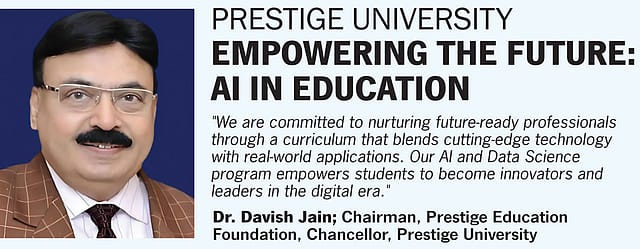PRESTIGE UNIVERSITY

Artificial Intelligence (AI) is no longer just a technological breakthrough—it is a transformative force reshaping industries, revolutionizing businesses, and redefining our daily lives. As AI continues to expand its influence across sectors, educational institutions are playing a crucial role in equipping students with the knowledge and skills required to excel in this dynamic landscape.
Artificial Intelligence (AI) is no longer just a technological breakthrough—it is a transformative force reshaping industries and redefining lives. As AI becomes integral to sectors like healthcare, finance, and manufacturing, the demand for skilled professionals is surging.
India's AI market is projected to reach $7.8 billion by 2025, according to NASSCOM. The World Economic Forum's Future of Jobs Report 2023 predicts AI-related skills will be among the top ten most in-demand globally, with nearly 19 million new jobs expected by 2025. To meet this demand, educational institutions must realign curricula and cultivate AI talent. Universities are responding with AI-driven programs that blend theory with practical application. The All India Council for Technical Education (AICTE) has declared 2025 as the "Year of Artificial Intelligence," aiming to integrate AI education into over 14,000 colleges—empowering 40 million students and aligning with the Prime Minister's vision of making India a global AI leader.
Institutions are partnering with technology firms to provide hands-on experience through internships, workshops, and real-world projects. AI labs are nurturing innovation, where students develop solutions like predictive maintenance systems and intelligent crop monitoring tools. These experiences foster problem-solving and entrepreneurial thinking.
Faculty development is key to delivering quality AI education. Institutions are investing in training, certifications, and global collaborations to ensure educators stay ahead of technological advancements and impart relevant knowledge effectively. To bridge the skills gap, institutions are emphasizing core competencies like data analysis, Python programming, and AI frameworks such as TensorFlow and PyTorch. Interdisciplinary learning is also gaining momentum, combining AI with fields like healthcare, law, and environmental science to boost students' adaptability and employability.By proactively embedding AI into academia, educational institutions are shaping a future-ready workforce of innovators and industry leaders. Their commitment to innovation, adaptability, and research will ensure that students not only succeed in AI careers but also drive meaningful change in society.
(A marketing initiative by Open Avenues)